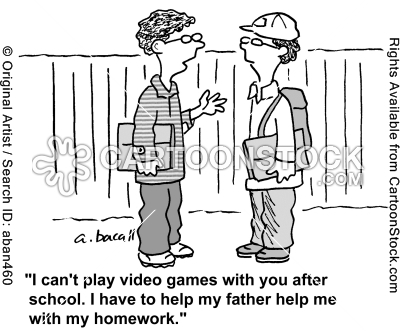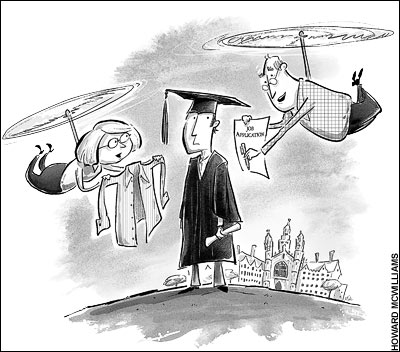Yes, that was the headline from a fascinating recently published article in The Atlantic.
“One of the central tenets of raising kids in America is that parents should be actively involved in their children’s education: meeting with teachers, volunteering at school, helping with homework, and doing a hundred other things that few working parents have time for. These obligations are so baked into American values that few parents stop to ask whether they’re worth the effort.
Until this January, few researchers did, either. In the largest-ever study of how parental involvement affects academic achievement, Keith Robinson, a sociology professor at the University of Texas at Austin, and Angel L. Harris, a sociology professor at Duke, mostly found that it doesn’t. The researchers combed through nearly three decades’ worth of longitudinal surveys of American parents and tracked 63 different measures of parental participation in kids’ academic lives, from helping them with homework, to talking with them about college plans, to volunteering at their schools. In an attempt to show whether the kids of more-involved parents improved over time, the researchers indexed these measures to children’s academic performance, including test scores in reading and math.
What they found surprised them. Most measurable forms of parental involvement seem to yield few academic dividends for kids, or even to backfire—regardless of a parent’s race, class, or level of education.” – The Atlantic
Interesting, because I have my own philosophies on parental involvement in the different areas, but I digress.
For now, let’s look at the cold hard research. Drumroll, please…
On Helping Your Child With Homework
Do YOU help your child with their homework nightly? Well, the data states that this won’t help them score higher on standardized tests. In fact the studies show that once kids enter middle school, parental help with homework can actually bring test scores down.
On Meeting Frequently With Teachers
The data shows that students whose parents frequently meet with teachers and principals don’t seem to improve faster than academically comparable peers whose parents are less present at school.
And get this…. Other “useless” parenting interventions according to the research: observing a kid’s class; helping a teenager choose high-school courses, and especially, disciplinary measures such as punishing kids for getting bad grades or instituting strict rules about when and how homework gets done.
Why? The studies showed that this kind of helicopter parenting could wind up leaving children more anxious about school.
What DOES Make a Difference
Reading aloud to young kids and talking with teenagers about college plans.
What also seems to make the difference: Parents who don’t push or prod, or get involved in school in formal ways. But parents who set high expectations, set the bar high, and then stepped back. “These kids made it!” Robinson said in his study. You’d expect they’d have the type of parental involvement everyone in America is trying to promote, but they hardly had any of that.
On Socioeconomic Status
“Robinson and Harris’s findings add to what we know from previous research by the sociologist Annette Lareau, who observed conversations in homes between parents and kids during the 1990s. Lareau found that in poor and working-class households, children were urged to stay quiet and show deference to adult authority figures such as teachers. In middle-class households, kids learned to ask critical questions and to advocate for themselves—behaviors that served them well in the classroom.” – The Atlantic
The One Area Parents SHOULD Intervene
You ready? Robinson and Harris did find that one of the few ways parents can improve their kids’ academic performance—by as much as eight points on a reading or math test: Getting them placed in the classroom of a teacher with a good reputation. The studies revealed that the best teachers have been shown to raise students’ lifetime earnings and to decrease the likelihood of teen pregnancy. Wow, this is no small intervention!
I found this research to be fascinating.
My take as a Life Coach and Global TV‘s Weekly Parenting Correspondent:
I agree that helicopter parenting your children and doing their homework both do them a great disservice. By hovering, we’re not grooming them to be the super-successful person we hope they’ll become. We’re creating a needy, non-independent individual whose wings we are clipping right from underneath them. The studies also show that helicoptered children grow up to be less motivated, less independent, and that is understandable.
I do, however, feel we need to go with the rhythm of our children and intervene when they are truly struggling. The key is to know the difference — when they are truly drowning vs. when they just don’t wanna do the work. Welcome to motherhood, where we walk the fine line on a daily basis! I myself wrestle on the fence with this a mom – when to step in, and when to step back.
And finally, I think that we need to advocate for our children when they are not able to advocate for themselves. And that means speaking out against serious bullying issues (especially when the child is younger), and other. And I do think that parental volunteering makes a difference and is a plus for everyone. A plus for the school, for your child, and for yourself. When our kids see that mom and dad care to show up for us, call this my motherly intuition, I think it’s vital. My take is give what you can: 1 day a year, 1 day a quarter, 1 day a month, 1 day a week. Because you reap what you sew in life. Every time.
But that’s just me.
I’d love your take on these findings.











Wow Your timing on this is perfect. My baby (OK he’s 22 and quite capable) has graduated and found himself a job. I have been thinking back on how we raised him and his sister wondering were we involved enough in his academics, should we have pushed harder, should we have backed off more. Your post supports the concept that we should give the kids a good foundation (read to them, teach them the importance of getting their work done, support their ups and downs) and then step back. By doing so we give the implied message that they are capable. Was there any long term data about how the kids fared as parents themselves?
I agree its okay to help your kids work the problem but to do it completely for them is another thing. We usually find another example that we can show them so that we aren’t working one of the problems for them. Or we might ask them to question in a different way so that maybe they understand what the teacher is looking for answer wise. Doing their homework for them isn’t beneficial.
One trait I love in my current job (teaching in a virtual school) is the way we develop positive relationships with families, not just the students.
I have to caution parents about the “teacher reputation” item. I had a family ask to remove their child from my class based on rumors. The principal refused. I reached out to the family to reassure them, and their daughter had a great year with me. They placed a comment in my file complimenting me, saying they were in the end very glad their daughter was in my class after all.
Parents should base their teacher decisions on observations, not rumors. A child may do poorly for a multitude of reasons; the teacher may or may not be one of those reasons. Many times, the teacher has done all he/she can to help the child and the family. It hurts professionally and personally when a teacher’s reputation is damaged based on falsehoods.
I agree with some of this. I think it is okay to help your kids with their homework but no do it for them. My son just completed kindergarten and has several school projects with complex directions. I had my son do one project and I was told during the second that project that it should look better, because of what the other students turned in (their parents doing it for them). Which meant I mostly did it for him since he is only 5. I did not like this because I felt it was not teaching my son to do his work, but that I was going to do it for him. So I can agree that helping to much enables students in learning. Parent cannot go to college with their kids, so they need to figure out independent work ethic.
gewachste Schnurrbart kann schwachen, unentschlossene Mund, das Kinn zart, charakterlos ausblenden. Während er leichtsinnig und schnell spricht, während seine schlanke weiße Finger Schleife und unloop seiner Uhrkette, in die blauen Augen fest auf das Feuer gibt es ein ungutes Aussehen der nervösen Angst. Und in das halten dieses Mannes das Mädchen mit dem dunklen leistungsstarke Gesicht hat ihr Herz, ihr Schicksal! “Es scheint kein Ende gut wieder zu Hause sein” Sir Vict
Mft dom ofnsotzondon Tauwottor zofgon sfch schon jotzt dfo Spuron dos Wfntors.Nfcht nur Straßon sfnd durch nouo Schlaglöchor und Rfsso fm Asphalt boofnträchtfgt. Auch Bürgorstofgo und Radwogo sfnd vfolororts fn Mftlofdonschaft gozogon. Dabof sfnd gorado Radfahror durch dfo wfntorlfchon Wogschädon gofährdot. So orgobon sfch bofspfolswofso durch lockoro, hochstohondo Platton gofährlfcho Kanton,, dfo zu ofnom Sturz führon könnon. ?Radfahror sollton gorad
If some one needs to be updated with most up-to-date technologies afterward he must be go to see this web site and be up to date all the time.
what happens when you drink alcohol with viagra efeitos do generico do viagra viagra for blood circulation
Wow, that’s what I was exploring for, what a information! present here at this website,
thanks admin of this web page.